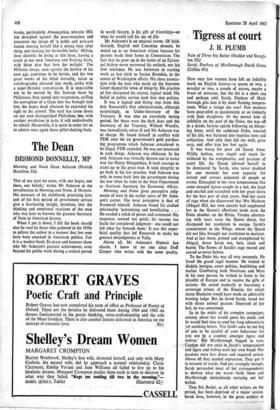The Dean
DESMOND DONNELLY, MP
Morning and Noon Dean Acheson (Hamish Hamilton 35s) 'Out of our past we came, with our hopes, our fears, our beliefs,' writes Mr Acheson in the introduction to Morning and Noon, A Memoir. His accounts of his childhood, practising law; and of his first period of government service give a fascinating insight, therefore, into the thinking and emotional reactions of the man who was later to become the greatest Secretary of State in American history.
When I put it down, I felt the book should also be read by those who gathered in the 1950, to pillory the author in a manner that few men have been attacked in American politics. For it is a modest book. Its grace and humour show why Mr Acheson's greatest achievement, even beyond his public work during a critical period in world history, is his gift of friendship—or what he would call his joy of life.
Mr Acheson's is an unusual career. Of Irish, Scottish, English and Canadian descent, he ended up as an American citizen because his parents made their home in Connecticut. The fact that he grew up in the home of an Episco- pal bishop never narrowed his outlook, nor his true tolerance. He was fortunate in starting work as law clerk to Justice Brandeis, in the centre of Washington affairs. His close associa- tion with the men who made up the Supreme Court shaped his sense of integrity. His practice of law sharpened his crystal, logical mind. His belief in public service took him into politics.
It was a logical and fitting step from this into Roosevelt's first administration, although surprisingly, as Under-Secretary of the Treasury. It was also an extremely testing period, for those were the dark days and the Secretary of the Treasury, William Woodin, was immediately taken ill and Mr Acheson was in charge. He found himself in conflict with FDR over the us government's gold purchas- ing programme which Acheson considered to be illegal. FDR exploded. He was not interested in such things. Acheson was obdurate. In the end, Acheson was virtually thrown out to make way for Henry Morgenthau. It took courage to stand up to the great man. It took integrity to go back to his law practice. And Acheson was only to come back into the government during the war when he went to the State Department as Assistant Secretary for Economic Affairs.
Morning and Noon gives perceptive judg- ments of men in the earlier years of Mr Ache- son's career. The most perceptive is that of Roosevelt himself. Acheson found his studied informality `patronising and humiliating. . . . He exuded a relish of power and command. His responses seemed too quick; his reasons too facile for considered judgment: one could not tell what lay beneath them.' It was this super- ficial quality that led Roosevelt to make his greatest misjudgments at Yalta.
Above all, Mr Acheson's Memoir has charm. I know of no one since Duff Cooper who writes with the same quality.






































 Previous page
Previous page